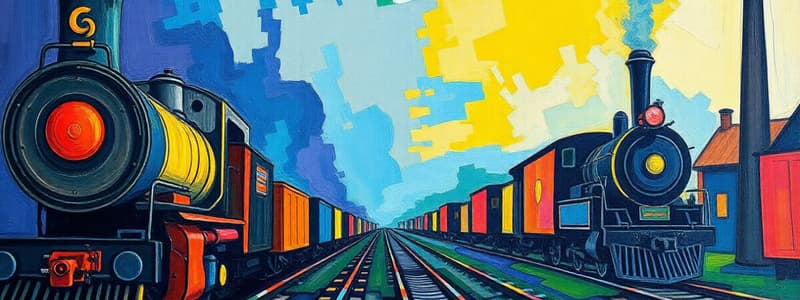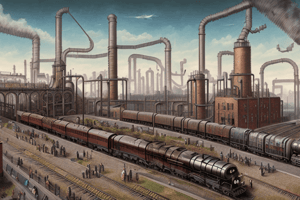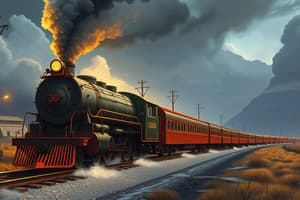Podcast
Questions and Answers
What geographical feature was crucial for industrialization in both Great Britain and the United States?
What geographical feature was crucial for industrialization in both Great Britain and the United States?
- Mountain ranges for timber.
- Fast-flowing rivers for transportation. (correct)
- Coastlines for fishing.
- Deserts for mining.
What major event prompted the United States to develop independent industries during the early 19th century?
What major event prompted the United States to develop independent industries during the early 19th century?
- The Louisiana Purchase.
- The War of 1812. (correct)
- The signing of the Constitution.
- The California Gold Rush.
Which resource was essential for the mechanization of industries in the United States?
Which resource was essential for the mechanization of industries in the United States?
- Coal. (correct)
- Gold.
- Copper.
- Silk.
Which factor did NOT significantly contribute to the spread of industrialization from Great Britain?
Which factor did NOT significantly contribute to the spread of industrialization from Great Britain?
What was the first industry to industrialize in the United States?
What was the first industry to industrialize in the United States?
What was one of the main reasons young single women left their rural homes to work in factories?
What was one of the main reasons young single women left their rural homes to work in factories?
Which statement best describes the working conditions of mill girls?
Which statement best describes the working conditions of mill girls?
What sentiment did the mill girls express regarding their newfound independence?
What sentiment did the mill girls express regarding their newfound independence?
Which of the following industries was NOT mentioned as undergoing mechanization during this period?
Which of the following industries was NOT mentioned as undergoing mechanization during this period?
What was a common alternative job for young women before they worked in mills?
What was a common alternative job for young women before they worked in mills?
What significant change occurred in the Northeast during the early 1800s?
What significant change occurred in the Northeast during the early 1800s?
In what year did the Civil War end, marking a significant turning point for U.S. industry?
In what year did the Civil War end, marking a significant turning point for U.S. industry?
What does the term laissez-faire translate to in English?
What does the term laissez-faire translate to in English?
Which philosopher is primarily associated with defending the concept of laissez-faire economics?
Which philosopher is primarily associated with defending the concept of laissez-faire economics?
According to laissez-faire economics, what role should the government play in trade?
According to laissez-faire economics, what role should the government play in trade?
Which of the following is NOT one of Adam Smith's three natural laws of economics?
Which of the following is NOT one of Adam Smith's three natural laws of economics?
What economic system allows for the private ownership of production factors?
What economic system allows for the private ownership of production factors?
Who criticized heavy tariffs on foreign goods and argued that it interfered with wealth production?
Who criticized heavy tariffs on foreign goods and argued that it interfered with wealth production?
What does the law of competition suggest?
What does the law of competition suggest?
Which economist's ideas contributed to the foundational principles of laissez-faire capitalism alongside Adam Smith?
Which economist's ideas contributed to the foundational principles of laissez-faire capitalism alongside Adam Smith?
What is the potential outcome of an unregulated market according to laissez-faire economics?
What is the potential outcome of an unregulated market according to laissez-faire economics?
What did Malthus and Ricardo believe regarding minimum wage laws?
What did Malthus and Ricardo believe regarding minimum wage laws?
What is the primary belief of theorists who argue for government intervention in the economy?
What is the primary belief of theorists who argue for government intervention in the economy?
Which philosopher is associated with the concept of the 'invisible hand'?
Which philosopher is associated with the concept of the 'invisible hand'?
What was Alexis de Tocqueville warning about in his observations?
What was Alexis de Tocqueville warning about in his observations?
What does laissez-faire philosophy advocate?
What does laissez-faire philosophy advocate?
What outcome did Malthus and Ricardo associate with population growth?
What outcome did Malthus and Ricardo associate with population growth?
What action did Adam Smith take after his death that contrasted with his economic philosophy?
What action did Adam Smith take after his death that contrasted with his economic philosophy?
Which idea is NOT aligned with the beliefs of those arguing against laissez-faire policies?
Which idea is NOT aligned with the beliefs of those arguing against laissez-faire policies?
What did sociopolitical theorists argue regarding the wealthy's responsibility?
What did sociopolitical theorists argue regarding the wealthy's responsibility?
Flashcards
Industrialization
Industrialization
The process of using machines and factories to produce goods, which started in Great Britain and spread to other countries like the United States.
Industrial Revolution
Industrial Revolution
A period of rapid technological advancements in the 18th and 19th centuries, characterized by the shift from hand production to machine production.
Stock Corporation
Stock Corporation
A company that sells stock shares to raise money and spread risk among many owners.
Blockade
Blockade
Signup and view all the flashcards
Industrialization in the United States
Industrialization in the United States
Signup and view all the flashcards
Malthus and Ricardo's view on population growth
Malthus and Ricardo's view on population growth
Signup and view all the flashcards
Adam Smith's 'invisible hand' theory
Adam Smith's 'invisible hand' theory
Signup and view all the flashcards
Laissez-faire philosophy
Laissez-faire philosophy
Signup and view all the flashcards
Mill Girls
Mill Girls
Signup and view all the flashcards
Technological Boom
Technological Boom
Signup and view all the flashcards
Mechanization
Mechanization
Signup and view all the flashcards
Putting out system
Putting out system
Signup and view all the flashcards
Urbanization
Urbanization
Signup and view all the flashcards
Northeast (United States)
Northeast (United States)
Signup and view all the flashcards
Laissez-faire
Laissez-faire
Signup and view all the flashcards
Laissez-faire
Laissez-faire
Signup and view all the flashcards
Laissez-faire Economics
Laissez-faire Economics
Signup and view all the flashcards
Law of Competition
Law of Competition
Signup and view all the flashcards
Law of Supply and Demand
Law of Supply and Demand
Signup and view all the flashcards
Law of Self-Interest
Law of Self-Interest
Signup and view all the flashcards
Capitalism
Capitalism
Signup and view all the flashcards
Adam Smith
Adam Smith
Signup and view all the flashcards
Classical Economics
Classical Economics
Signup and view all the flashcards
Study Notes
Industrialization Spreads
- Great Britain's geography, finance, political stability, and natural resources fueled industrialization
- British merchants built early factories
- Labor-saving machines and factories proliferated
- The Industrial Revolution spread to the United States and continental Europe
- The United States possessed resources similar to Britain
- America's blockade during the War of 1812 spurred domestic industrial development
- Industrialization in the United States began in textiles
- Samuel Slater, a British mill worker, emigrated to the U.S. and built a spinning machine from memory
- Moses Brown opened the first U.S. factory in Pawtucket, Rhode Island (1790)
- Francis Lowell and others mechanized every textile production stage (1813)
- Railroad systems fueled westward expansion
Growth of Railroads in the United States
- Railroads grew rapidly in the US
- Most early railroads were in the Northeast
- Trackage increased between 1840 and 1890
The Rise of Corporations
- Large businesses needed significant funding
- Entrepreneurs sold stock to raise funds
- Corporations, owned by stockholders, became dominant
- Corporations could raise capital for industrial equipment
- Large corporations like Standard Oil and Carnegie Steel rose
Global Impact
- Belgium adopted British technology quickly
- Belgium had abundant resources and waterways
- William Cockerill smuggled British machinery designs to Belgium
- Germany industrialized by replicating British models
- Germany's dispersed resources and political divisions initially hampered industrialization
- The German industrial growth was spurred by rail road building linking resources and cities
- Japan industrialized to become an industrial state (1868)
The Impact of Industrialization
- Industrialization increased global competition and global inequality
- Industrialized nations required raw materials from developing nations
- Industrialization led to imperialism (policy of extending one country's rule over other lands)
Reforming the Industrial World
- Industrialization created a large gap between the rich and poor
- Laissez-faire economics advocated minimal government interference in business
- Laissez-faire philosophy stemmed from Enlightenment thinkers' criticisms of high tariffs
- Adam Smith argued that economic liberty was essential for progress
- Smith believed that three natural laws - self interest, competition, and supply and demand - governed the economy
- Thomas Malthus and David Ricardo supported Smith's laissez faire ideals
The Rise of Socialism
- Reformers challenged the laissez-faire approach
- Socialists believed that government intervention was crucial for improving worker's lives
- Socialists argued that public ownership of industries would improve worker's lives
- Socialists like Louis Blanc advocated for expanding voting rights
- Karl Marx introduced Marxism as a radical form of socialism.
- Marx and Engels outlined their ideas in the Communist Manifesto (1848)
- Marx argued that history was based on class struggle between the bourgeoisie(owners) and the proletariat (workers and laborers)
- Marx predicted that the proletariat would overthrow the owners
Reform Laws
- Labor unions emerged demanding better conditions and wages
- Unionization involved collective bargaining
- Strikes were common tactics
- British and American governments enacted reforms to address child labor, working conditions, and women's rights
- Women and Children's working hours and working conditions were improved
- The abolishment of slavery in the British Empire (1833)
- Slavery in the US ended with the Civil War (1865)
The Reform Movement Spreads
- Reforms began in response to industrialization's negative effects
Studying That Suits You
Use AI to generate personalized quizzes and flashcards to suit your learning preferences.
Related Documents
Description
This quiz examines the factors that fueled industrialization in Great Britain, the spread of industrial practices to the United States, and the rapid growth of railroads in the 19th century. It highlights key figures and milestones, including the establishment of early factories and the expansion of transportation systems that contributed to westward expansion.




